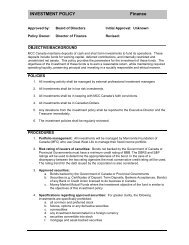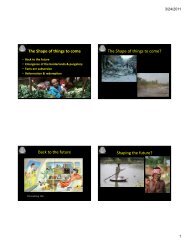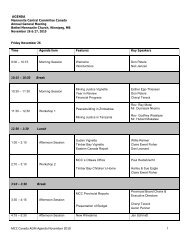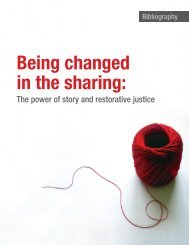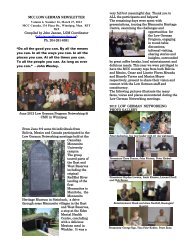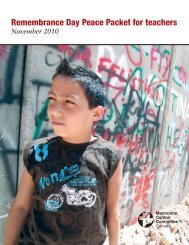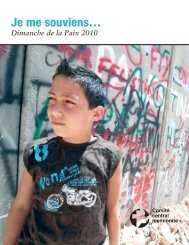Walking together: Healing and hope for Colombian refugees
Walking together: Healing and hope for Colombian refugees
Walking together: Healing and hope for Colombian refugees
Create successful ePaper yourself
Turn your PDF publications into a flip-book with our unique Google optimized e-Paper software.
w a l k i n g<br />
t o g e t h e r<br />
51<br />
Social situations <strong>and</strong> interpersonal relations:<br />
Many interviewed <strong>Colombian</strong>s alluded to differences<br />
in terms of equality <strong>and</strong> social stratification. As<br />
displaced people in Colombia they had experienced<br />
discrimination <strong>and</strong> marginalization in Colombia. Being<br />
treated as equals in Canada was one of the most<br />
common observations about the cultural differences<br />
they had noticed since arriving in Canada.<br />
“In Colombia people recognized me around the<br />
country <strong>and</strong> I was well liked as a newscaster <strong>and</strong><br />
journalist. After my displacement I used to be<br />
embarrassed easily. In Colombia you have to wear<br />
nice clothes, a suit <strong>and</strong> tie, if you go to the bank or<br />
go out shopping. Here you don’t have to do that, no<br />
one is paying attention to how I dress, to what I eat.<br />
If I go into the bank with s<strong>and</strong>als <strong>and</strong> shorts, no one<br />
cares. Here there isn’t discrimination about what one<br />
is buying, whether I’m buying rice <strong>and</strong> eggs (food <strong>for</strong><br />
a poorer person) or whether I’m buying meat (food <strong>for</strong><br />
a richer person).” - Carlos<br />
“I realize that no one looks at you here. If you are walking in flip flops it looks normal. People mind their own<br />
business, their shopping - they aren’t paying attention to you. It is a different culture, but they see us as normal.<br />
It’s not like in Colombia where if you go to a bank or to a store wearing simple clothing the door guards ask you<br />
what you want, what you are doing there....[Here] if you don’t speak English people try to help you.” - Roberto<br />
“It’s neat to learn about another culture. We’ve noticed a lot of differences: At the supermarket women with<br />
little children go ahead. Children are given a lot of privileges here. Honesty: we left our wedding rings in a<br />
doctor’s office, later we returned <strong>and</strong> they had saved them <strong>for</strong> us.” - Jorge<br />
“There are times when I’m walking on the street <strong>and</strong> people that I don’t know greet me saying ‘good morning.’<br />
They don’t look at me they way they did in Colombia - when one walks in the street <strong>and</strong> when a rich person<br />
passes they look down on you. The people treat me much better here...My son felt a lot of discrimination in<br />
Colombia, he was considered a “special child” <strong>and</strong> wasn’t allowed to attend school, <strong>and</strong> here they treat him<br />
like any other child. He is not the same as he was in Colombia. Here he is waking up, he is adapting to the<br />
other children. He speaks more! He underst<strong>and</strong>s a lot. He is learning to write. He has many friends <strong>and</strong> the<br />
teachers love him. He is learning how to greet people with his h<strong>and</strong> rather than by hugging.” - Adriana<br />
Driving etiquette: Observations about compliance with the rules of the road speak to the difference<br />
between being behind the wheel in Colombia <strong>and</strong> in Canada.



